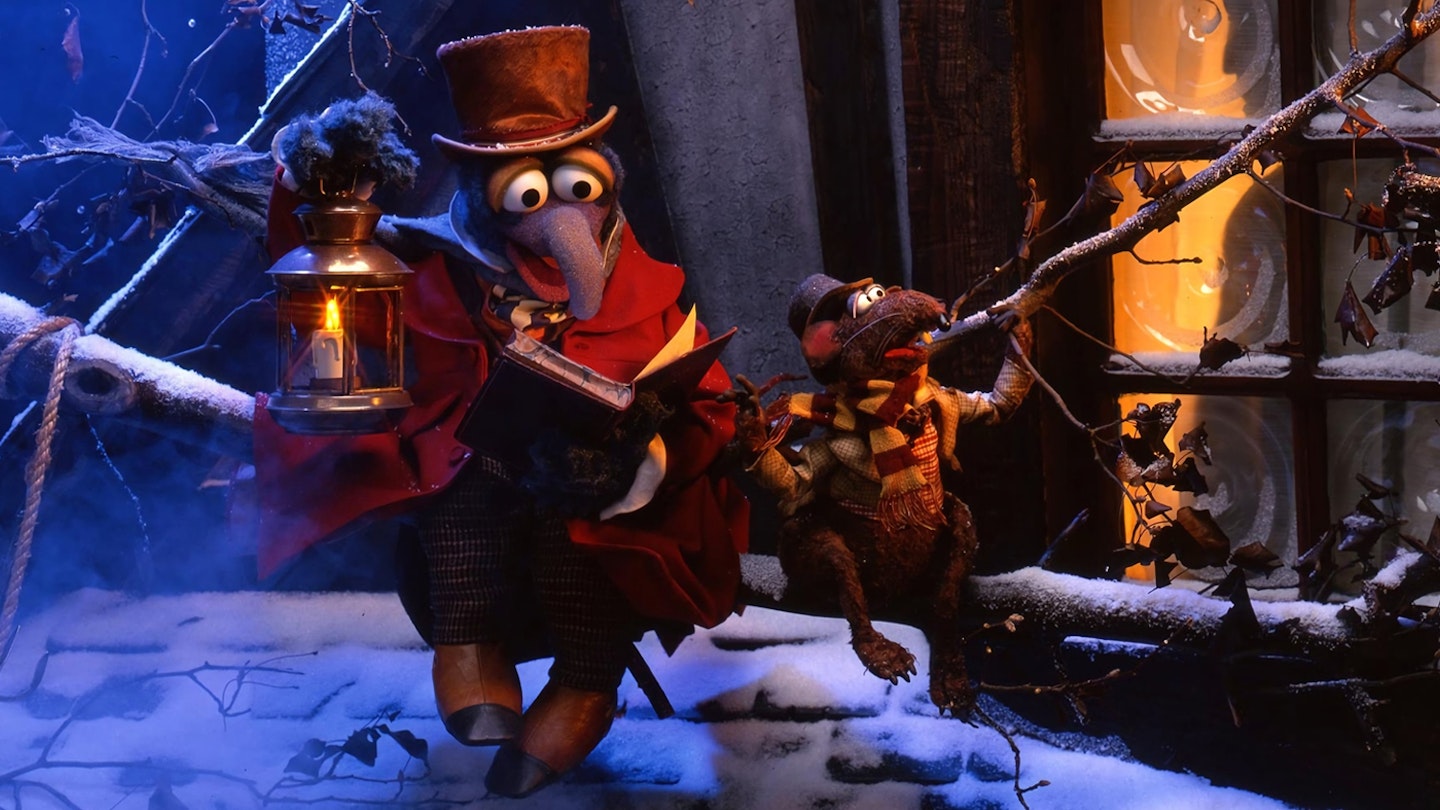In the spring of 1992, the legendary singer-songwriter Paul Williams was walking in a park in the Los Angeles sunshine, thinking about Christmas. Sixteen years after first working with the Muppets, he was about to return to their colourful world, but he was apprehensive. Years of rock ’n roll debauchery having finally caught up with him, The Muppet Christmas Carol would be the first project he’d worked on sober in forever. Three decades later, he tells Empire, he needn’t have worried. “I sat on a bench and Scrooge’s song suddenly started coming to me: ‘Bom-bom-bom-bom… When a cold wind blows it chills you…’ I think I got as far as ‘There goes Mr Humbug, there goes Mr Grim / If they gave a prize for being mean, the winner would be him’ before I paused at all. I was like, 'Hey, that’s pretty good!' I was so glad I had my tape recorder because I couldn’t have written it down fast enough.”
We’re speaking in honour of The Muppet Christmas Carol’s 30th anniversary, marked by the theatrical and Disney+ release of a newly-extended version that includes a previously deleted Williams song. The film is now a festive perennial beloved by generations, and yet, in 1992, it was far from a surefire success. After their raucous '70s heyday, the Muppets in the '80s had been quieter, their creator Jim Henson moving on to the ambitious new worlds of The Dark Crystal, Labyrinth, Fraggle Rock and The StoryTeller. Their last cinematic outing had been The Muppets Take Manhattan in 1984, and by the time of the ABC television special A Muppet Family Christmas in 1987, their appeal was already starting to feel nostalgic. Henson’s unexpected death in 1990, at the age of only 53, threw the Muppets’ future into question completely. Nobody knew if Jim’s creations could survive without him.
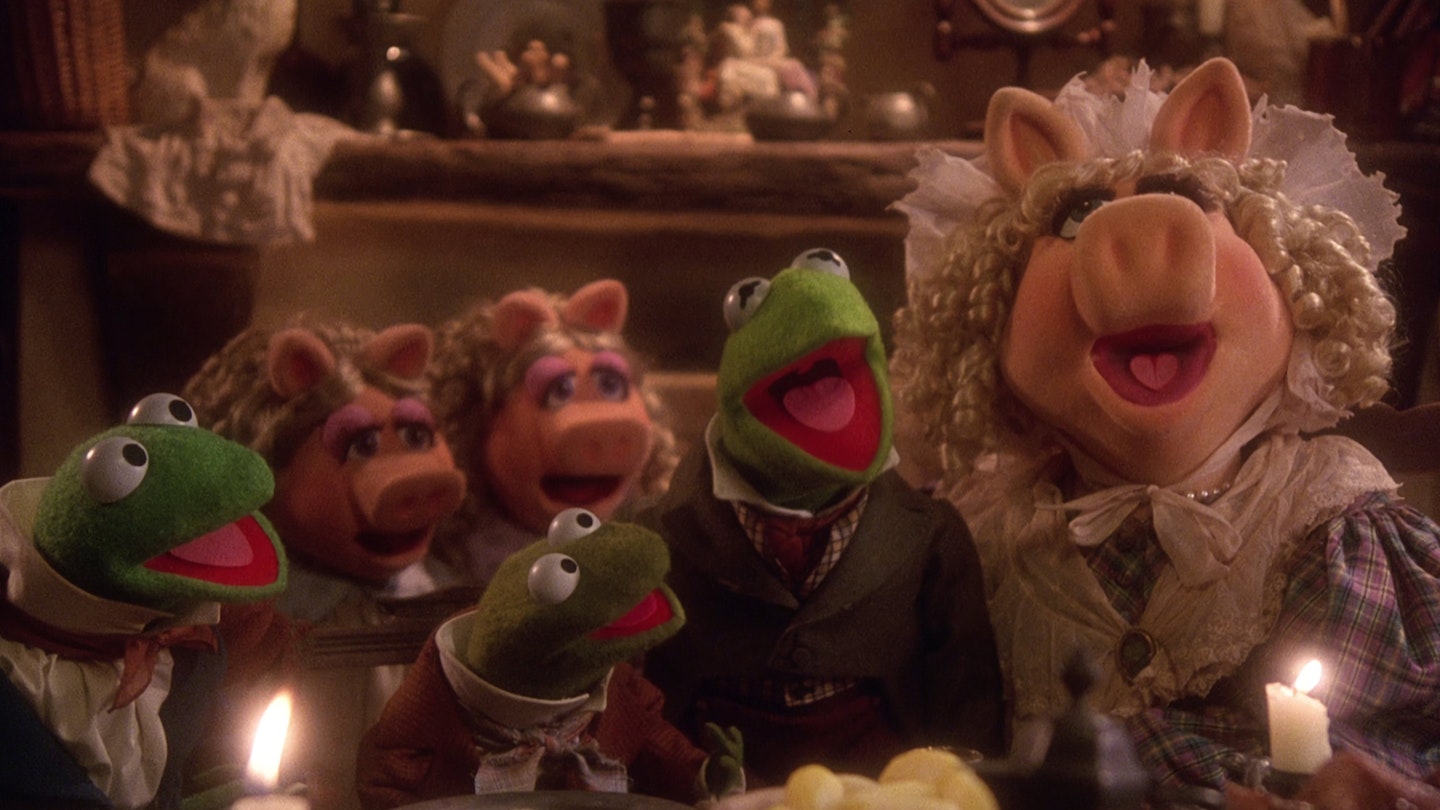
There’s magic in the air…
The Muppet Christmas Carol, like The Muppet Family Christmas, began life as a television project. Brian Henson, Jim’s son, was by 1992 running the Henson Company, and the idea was sprung on him by his agent, Bill Haber. "Bill basically called me and went ‘I just made a sale for you,’” Henson laughs. “I asked him what that meant. He said he’d called ABC and said, ‘I want you to do something with the Muppets,’ and they said, ‘Well, what?’ and he, as a lover of the classics, said, ‘A Christmas Carol!’ It really was all him.”
Adapting Charles Dickens’ famous, and already much-filmed, story presented a fascinating new challenge: it would require the Muppets to play characters other than themselves. Henson and writer Jerry Juhl initially envisaged the project as a parody, with the Muppets as a Monty Python-style ensemble running riot through the story of Scrooge. But as the writing progressed, Henson and particularly Juhl became less keen on that approach.
“Jerry just fell so in love with the book,” Henson recalls. “He was like, ‘Brian, this is so good, I don’t think we can make fun of it anywhere. I think we can just do it.’ So then it was a case of finding the formula that would make this exciting and unique."
We decided that everything about the film should celebrate between the Muppets and Dickens – Brian Henson
The book and the Muppets were not an obvious match. Dickens’ tale, as you’ll be well aware, is of the heartless Scrooge; his considerable fortune (which he does nothing with) propped up by the abject poverty of his debtors, until visits from the ghosts of Christmas Past, Present and Future – plus his late partner Jacob Marley – convince him to turn his life around. For most of its short page-count, Dickens’ original is sombre, sometimes bleak, and noticeably angry – the Ghost Of Christmas Present furiously confronts Scrooge with two cadaverous children called Ignorance and Want, for example. We perhaps think of it as inherently feelgood thanks to the redemption that comes at the end: a story about light returning to the world in the depths of winter. But that warmth arrives, Henson realised, “surprisingly late” in the story. There were seemingly few opportunities for Muppet-y knockabout comedy.
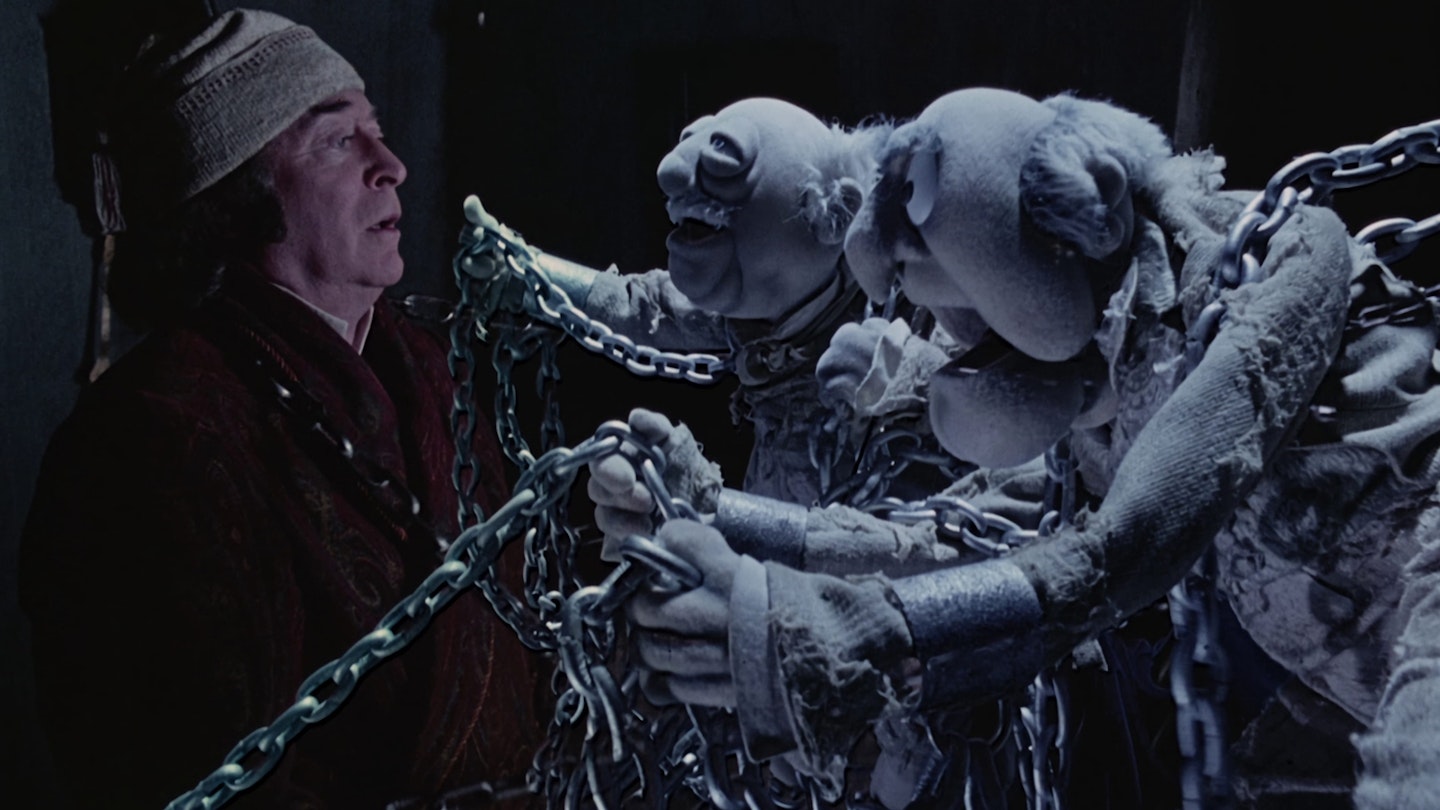
The tone of the project was also unavoidably informed by the absence of Brian’s father. “It was unthinkable that Jim was gone,” lifetime Muppet performer Dave Goelz recalls now, “but we all felt that the Muppets were our life’s work, and that we’d like to continue if it was possible. There was legitimate pathos among our characters, and it felt so right to do something that was beyond comedy. The Muppet Show world is always about misfits pulling together and managing to accomplish something, and in this case it was certainly coloured by the loss of Jim. We were ready for some emotion, I think.”
The world has got a smile today…
As the film developed, solutions presented themselves. “We decided that everything about the film – the costume design, the production design, the lighting – should celebrate the contrast between the Muppets and Dickens,” Henson explains, “so that in every scene and every moment you go, ‘I get what’s Muppets about this, and I get what’s Dickens.’” Victorian social commentary: Dickens. Singing vegetables and ice-skating penguins: Muppets.
Scrooge’s destitute clerk, Bob Cratchit (who in contrast to Scrooge lives in financial penury but has a life filled with love) would be played by – who else? – Kermit the Frog, performed with soulful respect in Jim’s absence by Steve Whitmire. Tiny Tim, Cratchit’s ailing son, would be Kermit’s little nephew Robin (Jerry Nelson). Miss Piggy (Frank Oz) played Bob’s wife Emily Cratchit (their offspring conveniently came out as pigs or frogs according to gender). Fozzie Bear (also Oz) was Scrooge’s former employer Fozziwig, who’s the proprietor of a rubber chicken factory (not a detail from Dickens, that last one). And in Juhl’s real stroke of genius, Goelz plays crook-nosed furry blue weirdo The Great Gonzo playing Charles Dickens himself: the film’s narrator, the better to get more of Dickens’ prose directly into the script, as well as some slapstick pratfalling and fourth-wall breaking commentary. “This is scary stuff. Should we be worried about the kids in the audience?” asks Gonzo’s accident-prone rat sidekick Rizzo (Whitmire again) at one point. “It’s alright,” Gonzo/Dickens reassures him. “This is culture.”
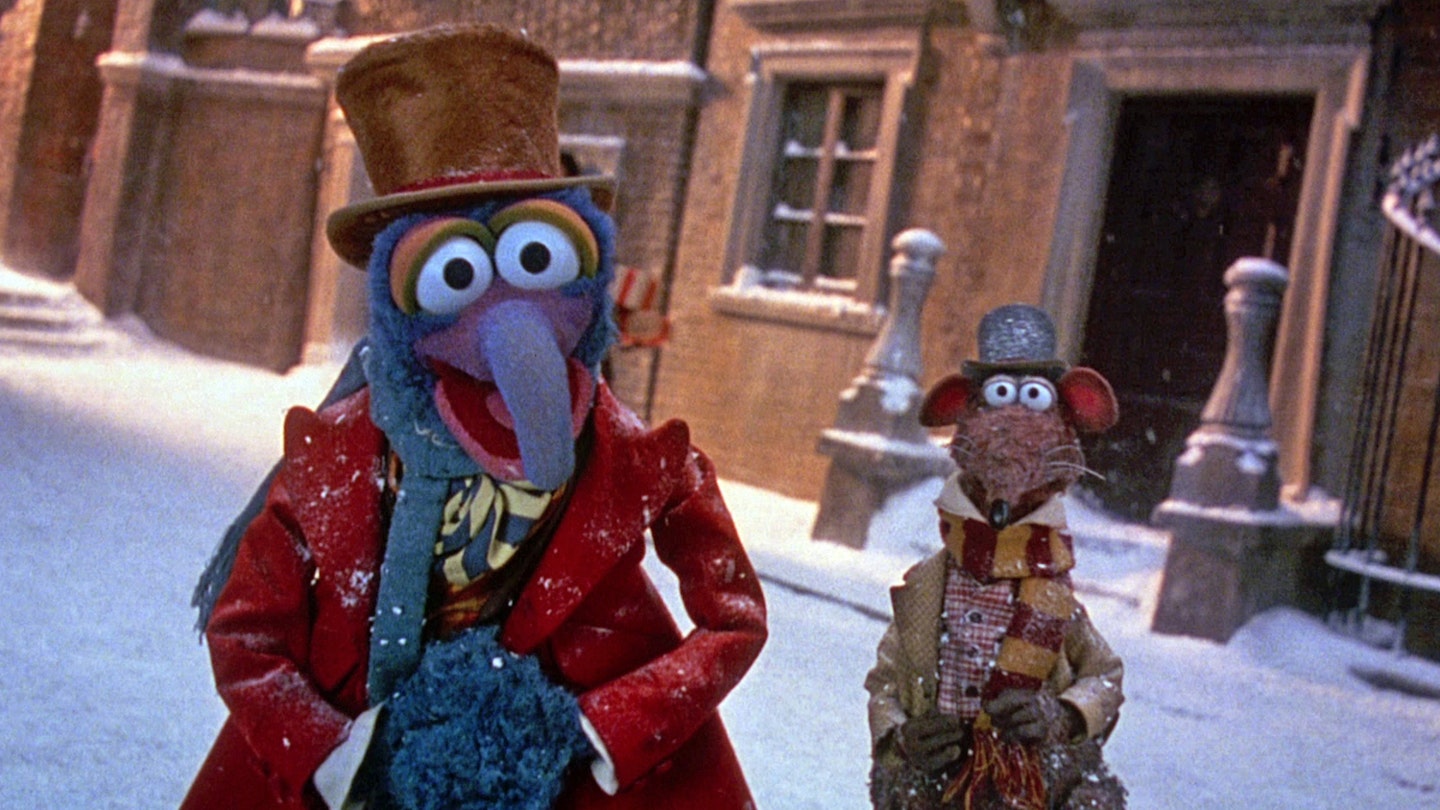
Scrooge himself could have ended up being a Muppet. Henson was initially reluctant to cast outside the puppets and suggests reptilian blue phantom Uncle Deadly could have fitted snugly into the miser’s threadbare overcoat and fingerless gloves. But once the idea of a parody was abandoned in favour of something deeper, Henson conceded that a human Scrooge was probably a better idea. Tim Curry was considered – but while it was felt that he was an obvious comedic match for the Muppets, comedy, as we’ve said, wasn’t top of the agenda (Curry would get to play next time, as Long John Silver in 1996’s Muppet Treasure Island). Ultimately, the only actor Henson approached was Michael Caine. His search for Scrooge began and ended with that conversation.
“Over the years, I watched all my friends appear on The Muppet Show, and I tried not to mind that I was never invited,” Caine grumbled in his 2010 memoir The Elephant To Hollywood, “but of course, in the end, I got to play the big part!” Henson says he thinks Caine was probably too busy in those days to have done it anyway (Caine was in a dozen movies between 1976 and 1981 when The Muppet Show was in production), but continues that Caine was his only choice in 1992 because “it was such a big role that it had to be an actor with huge star quality and celebrity, and one that was authentically British and could handle the dramatic role. The very first time I talked to Michael, he said he was going to play it utterly straight, as if it was for the Royal Shakespeare Company. We shot it as a drama, and that was the first time we’d done that with the Muppets. It was a lot of experimenting to see if this would work.”
It’s in the singing…
It’s also, of course, a musical. For the songs, Henson turned to Williams who, having previously composed for The Muppet Movie (which includes his beautiful 'The Rainbow Connection') and Emmett Otter’s Jug Band Christmas (a ‘70s Henson TV special) and appeared as a guest during The Muppet Show’s first season, was one of the original Muppet music men. Henson says that, along with John Denver, Williams was always the musician most in tune with the Muppets. Henson himself attributes that to a “folk element and a heartfelt lyricism,” but Williams, when Empire puts that to him, chuckles that it’s more to do with “avoiding adult behaviour”.
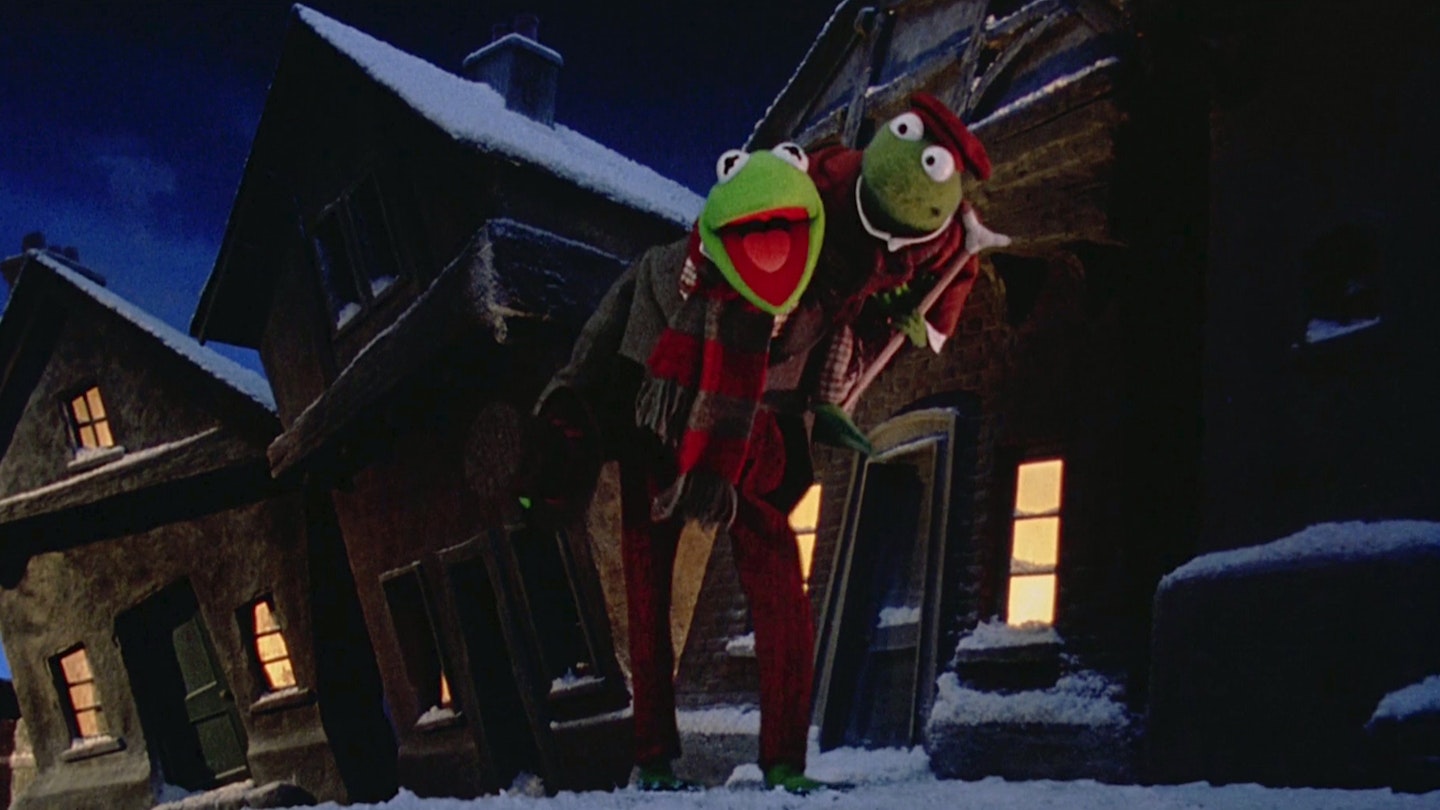
“The Muppet guys working together is wonderful,” he says, “because if it was a school room situation they’d have been separated: ‘You guys are really interesting and clearly you’re having a really good time, but you, go and sit over there!’ Jim and Frank and Dave and Jerry never had that fun shaken out of them, and neither did I.” Working with Brian was, he says, simply a continuation of the relationship he’d had with Jim.
Williams during the ‘70s and ‘80s had arguably, he says, had rather too much fun, and had a certain amount of lost professional ground to make up. When he was introduced to Caine on set, he told the actor how excited he was to meet him. “He said, ‘What do you mean?!’” Williams laughs, “‘We spent an entire weekend together in 1978!’ I think there may have been a little alcohol involved in those few days…” But unencumbered by alcohol in 1992, he says the words simply poured out of him. “I think very possibly Jim was at my shoulder,” he believes, “and God knows who might have been with him. I put my name on it because it’s the only one I’m sure of!”
We’re never quite alone…
Other aspects of the project didn’t quite go as easily. Disney, thanks to its existing relationship with both ABC and the Henson Company, had seen the opportunity of expanding The Muppet Christmas Carol into a theatrical feature. Henson was feeling overwhelmed. “I did not want to direct it,” he tells us. “I tried very hard not to. Up until then I had only directed second units and children’s TV series. I was not at the place in my career when somebody should give me a movie.” He was ultimately talked into it by the “love and faith” of the extended Muppet family – particularly Oz, who provided invaluable mentorship. But when it turned out that Disney were unrealistically expecting a full movie from little more than a TV budget, Henson almost pulled the plug rather than continue without the money he needed.
The secret to acting with the Muppets is to treat them as you would a live actor – Michael Caine
“Jeffrey Katzenberg [Disney’s CEO at the time] sent his head of physical production, Marty Katz, over to London where we were preparing,” Henson recalls. “Marty had a heart of gold, but he was Jeffrey’s heavy who would get sent in to put filmmakers in line. I showed him around the sets and he called Jeffrey and said, ‘They’re making $5 million more movie than they’ve even asked for. Give Brian the number he needs because I have no idea how he’s even doing it for that.’ We thought we might have to shut down, and then Marty came and immediately became our biggest champion.”
You can see why Katz might have been impressed. The Muppets had taken over Shepperton Studios, the stages of which were now transformed by Production Designer Val Strazovec and his crew into a vast, snow-covered Victorian London, parts of which could be dismantled and reinserted to accommodate the puppeteers working beneath and around everything that appears on screen. The unbelievable scale and ambition is immediately visible in the film’s incredibly busy opening number, as Caine, straight-faced as promised, stalks the streets in long tracking shots, accompanied by Williams’ brilliant scene-setting ‘Scrooge’ song and more than a hundred puppets. “The secret to acting with them is to treat them as you would a live actor,” Caine, speaking in 2018, told Empire. “Not like dummies with people below them with arms like bloody weightlifters.”
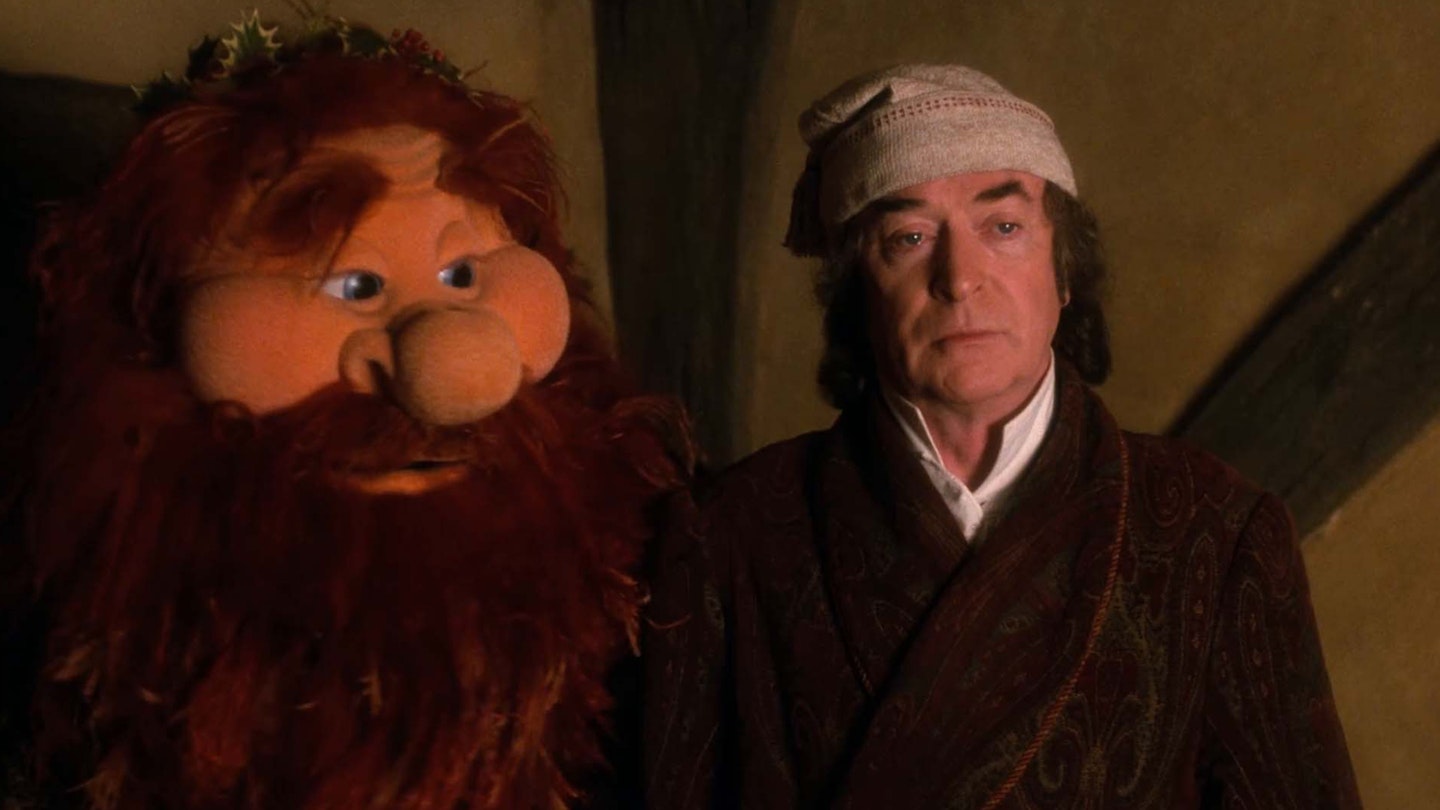
Following Katz’s endorsement, Henson says Disney became nothing but supportive. During the three-month shoot across the summer of 1992 there were some studio concerns that the film was too dark and not funny enough – but when test screenings demonstrated that the audience were enthusiastic, Henson says, "they didn’t make me make it brighter or funnier.” The only real compromise was the loss of Williams tune ‘When Love Is Gone’, from the end of the Ghost of Christmas Past section.
“They thought the kids wouldn’t sit still for it,” Williams shrugs, “which I never understood because it wasn’t necessarily just a kids’ movie. That was the beauty of both Mr Hensons’ work: they created something that was for all ages.” The loss of ‘When Love Is Gone’ meant that the song that closes the film, ‘When Love Is Found’, no longer had its counterpoint, and a key character moment for Scrooge was missing. For the anniversary re-release however, it’s back – much to Williams’ delight. “Michael’s performance during that song is so brilliant,” he beams, “and I don’t think I ever felt that I contributed more to advancing a film’s story.”
The summer of the soul in December…
In either version, the film contains all the Muppet humour and heart you might expect, but differs from the other Muppet movies in its sweetly melancholic air. When Kermit, in the Christmas-Yet-To-Come section, says of Tiny Tim, “life is made up of meetings and partings, that’s the way of it. I’m sure we shall never forget him, or this first parting that there was among us,” it’s easy to imagine that everyone involved was really thinking about Jim Henson. “I have never got through watching it with dry eyes,” Goelz tells us. “It just affects me so much.”
On its initial release, the film was popular with both audiences and critics, but only a modest box office success thanks to its perplexingly late arrival: by the time it entered cinemas in the UK on December 18 there were only seven more sleeps ‘til Christmas. The US got it a week or so earlier, but even that, Henson believes, “was by any standard three weeks too late.” The following year, however, Disney made festive amends. The Muppet Christmas Carol was one of the first videos to skip the rental market and go straight to ‘sell-thru’, filling stockings to the tune of tens of millions of dollars. The Muppets were no longer in danger of becoming a nostalgic thing of the past. They were current again. The aforementioned Muppet Treasure Island and the ABC series Muppets Tonight followed in short order, and Jim’s dream of seeing his beloved Muppets in Disney’s theme parks was eventually realised in 2005. Now in its fourth decade, The Muppet Christmas Carol is still charming audiences and finding new champions, as the buzz around the re-release attests.
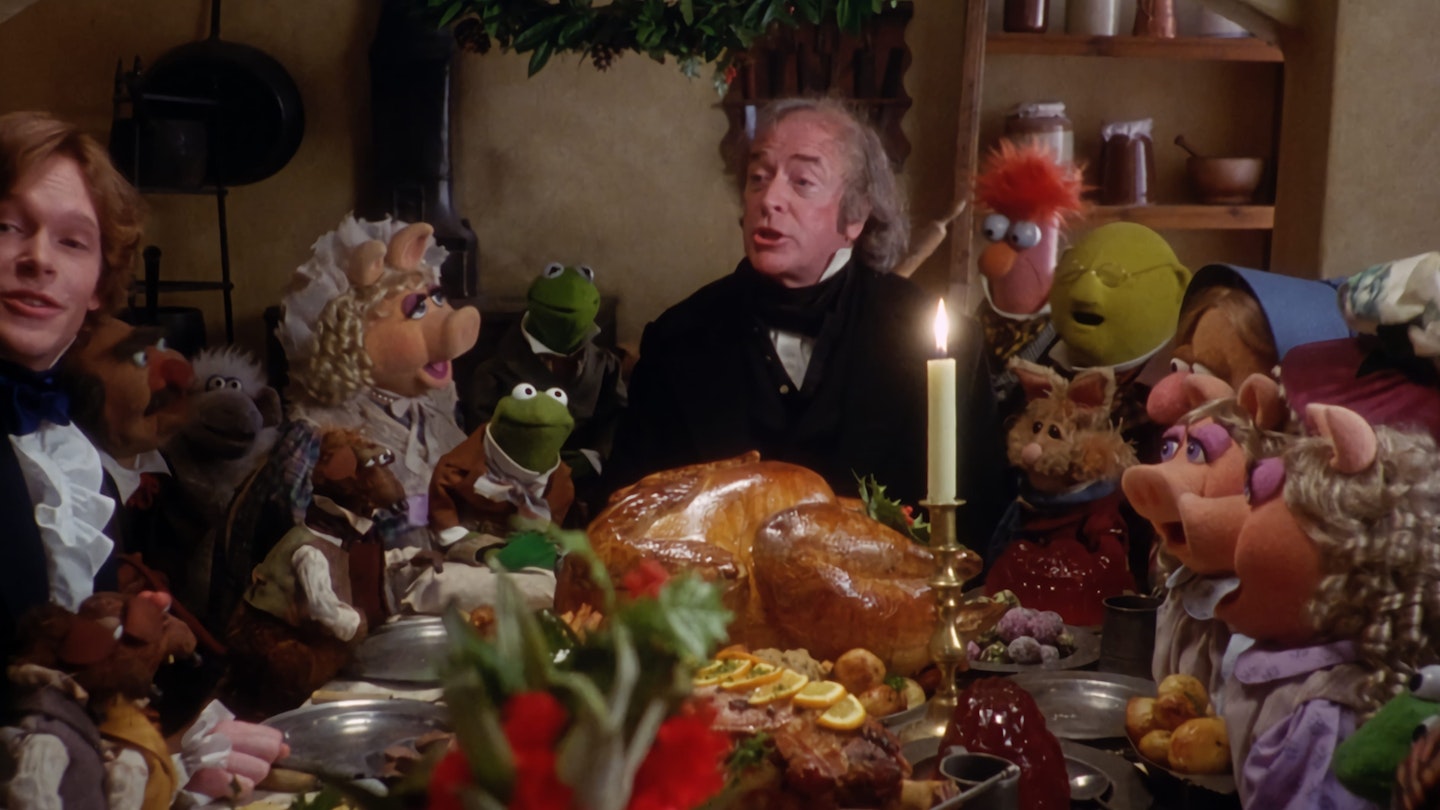
For Henson, The Muppet Christmas Carol’s legacy is that it “explores a depth to the Muppets that my dad was never really allowed to. It proved that the Muppets were flexible enough to do something extraordinarily different to anything they’d been in before.”
For Goelz it was “a test of all the stuff we had built together, the whole production entity that Jim had assembled. It was a continuation that was underlaid with tragedy, but it felt like the right thing to do, something that was true to emotions, and a foray into a new area which was really quite profound.”
For Williams it “kicked open the doors on a new creative phase of my life, and everything since has been painted with a lovely shade of gratitude.”
And for Caine, it was the rare film on his CV that he could show his children. "I made it for my daughter," he told Empire in 2018, "and now my grandchildren all love it too. I had a lovely time, working with all these kind, quiet, gentle people.” He says it taught him a glum lesson, though. “I’d never sang anything before. It was a bit of a surprise to me. I didn’t know I couldn’t sing.” Humbug, sir.
The Muppet Christmas Carol is back in UK cinemas from 2 December
